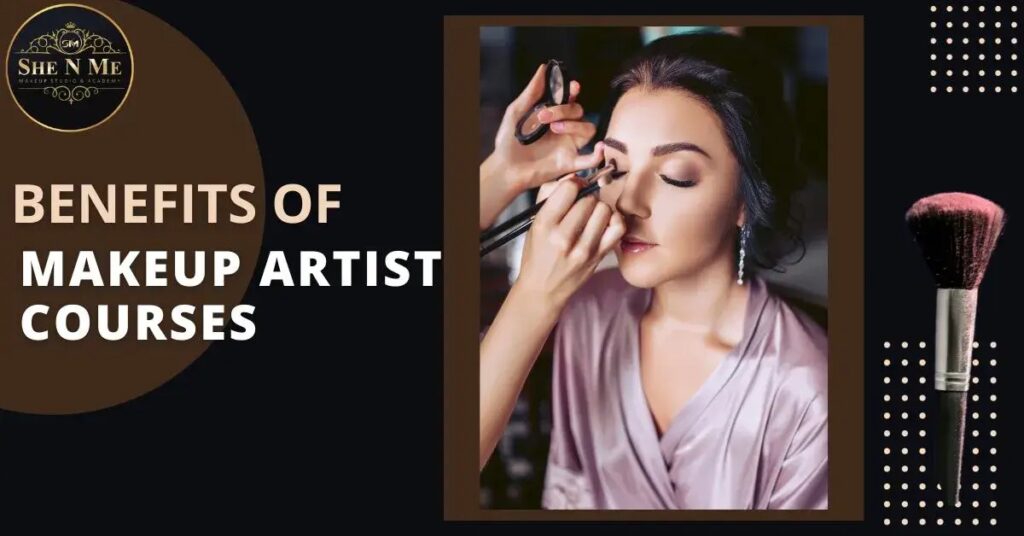WHAT IS PRO MAKEUP?
When referring to makeup that is of professional grade or appropriate for professional makeup artists, the phrase “pro makeup” is frequently used. It often entails using premium cosmetics and applying them in a way that produces a polished, perfect, and long-lasting appearance. Some essential components of a “pro makeup course” include the following:
High-Quality Items:
Additionally, makeup items from well-known, respected companies with a reputation for quality and performance are frequently used by professional makeup artists. Furthermore, these cosmetics often come in a greater variety of hues and tones to meet various demands and have superior pigmentation and lasting power.
Precision and skill:
Applying makeup professionally requires the use of exact procedures that may enhance a person’s characteristics, cover up flaws, and provide the desired look. To get the greatest effects, makeup artists are adept at contouring, mixing, and highlighting.
Long-Lasting Finish:
Professional makeup methods and materials are used to produce makeup that lasts all day or throughout an event, such as a wedding or photo session. Setting sprays, primers, and other long-lasting treatments are frequently used for this.
Customization:
Skilled makeup artists adjust their application to a person’s particular characteristics, style, and event. They take into account things like skin tone, facial structure, and personal preferences.
Versatility:
Natural, glamorous, wedding, fashion, dramatic, and special effects makeup are just a few of the many makeup techniques that professional makeup artists are educated in. They are able to modify their talents to fit the requirements of various clients and projects.
Hygiene and Sanitation:
Professional makeup artists adhere to stringent cleanliness and sanitation standards to protect their customers’ health and safety. This involves brushing and sanitizing instruments on a regular basis.
Education in Makeup Artistry:
Through makeup schools or courses, many professional makeup artists have received formal instruction and certification. Additionally, they receive the information and training necessary to succeed in the field thanks to this schooling.
Portfolio Development:
Building a portfolio of work is a crucial component of professional makeup. Through images of their prior clients and projects, makeup artists may demonstrate their talents and personal styles in order to draw in new customers.
Professional makeup is used in various industries , like film, TV, theater, photography, weddings, and events. It offers superior quality and attention to detail when specific criteria must be met.
PRO MAKEUP COURSE
A professional makeup artist course is a systematic educational program created to educate people on the abilities and methods required to practice makeup artistry professionally. These courses can range in length and level of teaching and are frequently provided by beauty schools, makeup academies, and institutes of higher learning.
Courses in professional makeup encompass a wide range of subjects and abilities, such as:
- Basic Makeup Fundamentals: Basic knowledge of skincare, facial forms, colour theory, and product expertise are all essential components of makeup.
- Sanitation and Hygiene: The cosmetics business should follow good hygiene and safety procedures.
- Tools and Equipment: Instruction on the numerous cosmetic products and tools used in the profession.
- Techniques: Methods for applying makeup in a variety of looks, including natural, wedding, fashion, dramatic, special effects, and more.
- Skin kinds and tones: How to choose the proper products and colours for various skin kinds and tones.
- Face contouring and highlighting: using shading and highlighting to give features depth.
- Eye Makeup: Eye makeup application methods, including how to use eyeliner, mascara, and fake eyelashes.
- Lip Makeup: Makeup for the lips includes lip liner, lipstick, lip gloss, and other products.
- Special Effects Makeup: Making wounds, scars, aging effects, and other theatrical or film-related makeup is known as special effects makeup.
- Makeup for Different Occasions: Makeup for weddings, editorials, runway shows, movies, and television.
- Business and Marketing: How to Start a Makeup Artistry Company, Develop a Portfolio, and Promote Your Services
- Client Interaction: talking to customers, learning about their preferences, and giving them a good experience.
Courses in professional makeup can range in length and complexity. While some schools offer complete programs that continue for several months, others may provide quick courses or seminars that last a few days or weeks. These programs frequently award certificates or diplomas to their graduates, which might be useful while looking for work in the fashion and beauty sectors.
To stay competitive in the industry, many makeup artists also keep up with the most recent trends and products while attending workshops and seminars.
PROFESSIONAL MAKEUP ARTIST COURSE FEES
The cost of professional makeup artist training can vary greatly based on a number of variables, including the school or academy’s reputation, its location, the length of the program, its degree of specialty, and its fees.
Before enrolling, research and compare schools, read reviews, check for extra costs. Consider career goals and if a pricier school is worth it for skills and job prospects.
MAKEUP ARTIST COURSE ABROAD
Studying makeup artistry overseas may be a wonderful way to see other cultures, get top-notch instruction, and possibly open up global employment opportunities.
Firstly, start by looking at nations with robust cosmetics and beauty industries. Additionally, reputable makeup schools are frequently found in nations including the United States, the United Kingdom, France, Australia, Canada, and South Korea. Moreover, look at the institutions and courses on offer in these nations.
Keep in mind that planning and preparation are essential for studying abroad.Before making a choice, it’s critical to consider the advantages, disadvantages, and probable difficulties. In addition, investigate several colleges, contrast their programs, and get in touch with admissions offices for further details.
I hope we saved your hair from hard water. And recommended the best ways to save your hair from it. Kindly stay in touch and keep reading our next blog on She N Me Salon for more knowledgeable content.
Follow us on our social media accounts for additional information. ![]()


